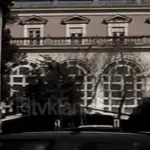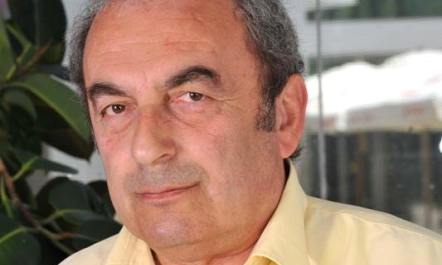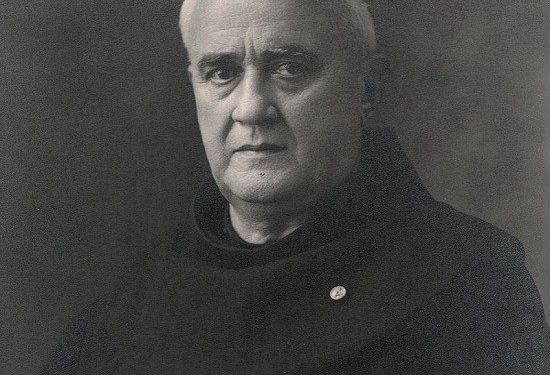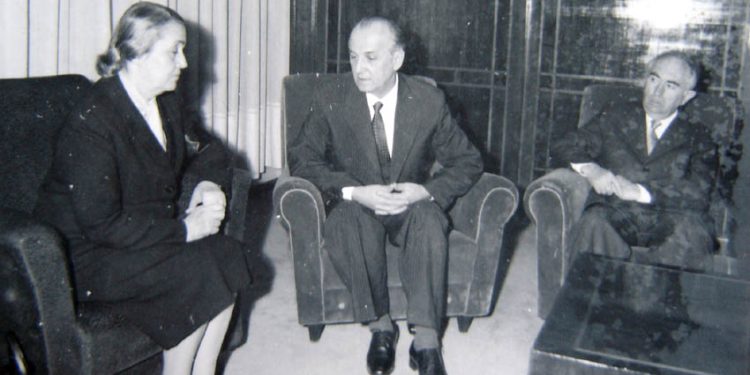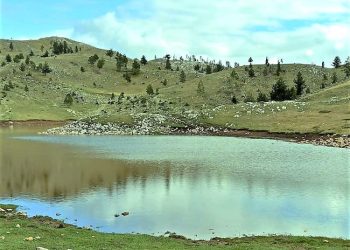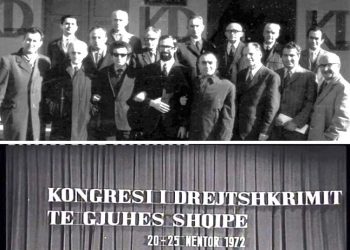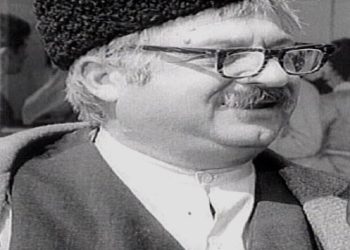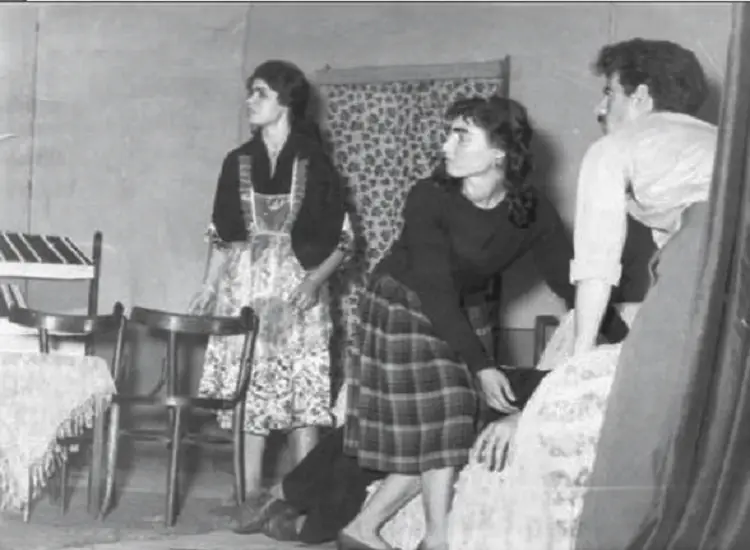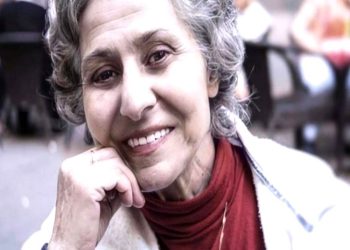By Ndue Dedaj
– Kadare and the Apology of the Great –
Memorie.al / I love dead poets”, says Lida Snjegina, the Russian girl in the novel “Dusk of the Steppe Gods”, which means that she did not love living writers. “She loves mainly dead writers”, reinforces Kadare. (I. Kadare, “Onufri”, Vepra, v. VIII, p. 66.) We brought this detail to say that now that we do not have Kadare, those who did not love him while he was alive will love him too. This is our habit, we cannot love writers while they are among us, for a hundred reasons. And yet they are already in life those of the afterlife.
In an interview given to Alketa Spahiu, Kadare would say: “Whether the writer wants it or not, death is part of his file. There is nothing pathetic in this expression…! The superiority of literature, art and every creation of spiritual values lies precisely in its connections with the future”. (“ExLibris”, January 25, 2025.)
Kadare was not an approachable nature, everyone noticed this about him, but not another ordinary person. In the latter, it would seem normal to us, since this is how we have types in life, while we would definitely want Kadare to like us, even to “love” us. Kadare was an appreciator for every writer, even for a young writer, when he was talented, but perhaps without many words. He, like all the greats, did not know the language of flattery. He accepted you and what more was needed. It was a special pleasure when he said; “I have read you” …!
- Due to the misunderstanding that the living has with the great, there has always been a need for an apology towards them. Gjergj Kastrioti was who he was, but Frang Bardhi was forced to write a long and argued apology about his Albanian origin. Even the poems of the Renaissance dedicated to his figure, have the purpose of reviving the glorious era. We were somewhat “confused” in our youth, when we read in literature books that Noli was from the City of Cologne, and why he was born in Ibrik-Tepe, somewhere between Greece and Turkey.
There was a fuss about the origin of Mother Teresa, until the evidence of her baptism in the Catholic church of Skopje was discovered, etc. But it is not only the origin that needs an apology, and it is not only foreigners who raise hypotheses, alibis, it is also the biography, like that of Kadare. Those who are unable to talk about Kadare’s characters, turn him into their own “character”, counting his alleged flaws. How is it possible to throw mud at eye to eye? The great writer was slandered for having said a harsh word about the embassy escapees of July 1990, someone swearing that this was published in the newspaper “Drita” in May of that year, when the escape would happen two months later, in July (!?).
Kadare denies it several times orally and in writing, but no one listens to him, because for those who are not serious and do not read the author’s work, urban legends are a delirious entertainment. Those who remember that hot and dry summer, must reason, how is it possible that at the great rally of the communist disaster in “Skënderbej” Square, the only one who was absent was Ismail Kadare! This is the news and not the rumors about him. Because Kadare could not have been in the wrong place, at the wrong time.
Meanwhile, Kadare’s attitude towards Fishta has received more attention than it should, to the point of creating a meaningless “duel” about which of the two was the greatest?! It happened only once and probably would not have happened if Kadare had not been asked to speak in November 1973, at the National Conference of New Talents, in Korça, which was a genuine congress of writers, with the presence of the secretary of the Central Committee for Ideology and the head of the Institute of Marxist-Leninist Studies, where he would say that; Fishta had been the greatest conservative of Albanian literature and also its greatest liberal, a speech that after a few months was published as an article in “Zëri i Popullit”.
The author of these lines, at that time a high school student in Mirdita, was in the hall. It should be known that the Conference, where Kadare could not escape without “getting wet” with his rhetorical discussion, was held in the spirit of the Fourth Plenum of the Party Central Committee of that year, which was the greatest enemy of literature and the arts in their entire history. Today’s populist commentators should know that only a year later, the Party would crown its ideological gravedigger action of literature and the arts with the speech of December 20, 1974, where Enver Hoxha would name writers and artists “loyal helpers of the Party in the communist education of the masses”.
O tempora, o mores! So, what is the point of this sacrilege of one great writer, towards another great writer, being taken up again and becoming a daily issue, after half a century? Let it be treated by literary biographers in the given context and that is enough.
Apparently, geniuses cannot cross the “Rubicon” without paying a high price to their unaccepting contemporaries. Kadare has been the subject of ideological attack, even his masterpiece novel “The Palace of Dreams” in the 1980s. How many prominent writers have become “problems” due to the misunderstanding of their (masterpiece) works at the time they were published, being (pre)judged for breaking moral, religious, ideological taboos, biography inappropriate for regimes, etc., such as Charles Baudelaire with “The Flowers of Evil”, James Joyce with “Ulysses”, Scott Fitzgerald with “The Great Gatsby”, etc.
In short, the great, as in the Middle Ages, as in modern times, have this fate, to be defended for what they are. The apology of the great is the misery of the small.
- One of the “reasons” for the dislike of writers while they are alive is the curse of biography, especially of those who lived under the communist regime. We have elaborated on this argument in a long article in the newspaper “Shqip” in 2006, specifically with Kadare as the subject, and we return to it, since even today writers are judged not for their work, but for how they had relations with the previous regime, not only the dead and living anathematized, such as; Fishta, Konica, Koliqi, Kokalari and Haxhiademi, but also Malëshova, Marko, Trebeshina, etc.
On the other hand, when you see the garbage of words with which writers are attacked today, it seems that those authors who died not in the age of the internet were lucky, having escaped the drool of insults and the Bolshevik-type “biography”, as well as the popular “classification”, who is first, who is second, who is third, as if it were a question of groomsmen at a wedding, who go to take the bride! It is the same mentality that for half a century denigrated Fishtë for the verses “Let the whole world know…”, without knowing their meaning.
The thing is that reading the work does not have this “price”, that of despising the author through biography. But all this is a futility, they already live beyond themselves and time. As for Kadare, there are only six letters to say it all, even without the name Ismail in front, as in the case of De Rada, Fishta, Migjeni, or Kafka, Kundera, Borges, etc.
It belonged to our generation, or rather the last two or three generations, to pass it on to eternity, but the writer has belonged to the Albanian reader for seventy years, since 1954, when he brought “Frymëzimet djaloshare” from Gjirokastra, which foretold a great talent for Albanian literature. Count his own readers, since then, here and in Kosovo, where those first generations that recognized him as a creator have died out.
But count his Albanian reader of tomorrow, who will not be divided as a part of today’s reader, who sees the writer between literature and biography, giving way to the latter, as if Kadare were to be a demigod on earth! And this is only one, the reader of his language and blood, but there is also that foreign reader of the forty-five languages of the world, which are only increasing.
So, just those six letters, with the accent on the last one, are enough, and there is no need for anything else, like “the genius of Albanian literature”, “the Albanian writer of world proportions”, etc. It will also be our identity card abroad. “You are… Kadare’s? That is, do you come from his country? From the Albanian language? Pass”! …
Any of us, who is passing through that “airport” without any planes landing or taking off, may hesitate for a moment. How?! You are saying that Kadare is a living myth?! But he… did not speak about the demolition of the Theater, did not criticize the government for its incompetence in the fight against cannabis, nor that other one yesterday for allowing “pyramids”! He did not take a pickaxe to demolish the socialist camp with a shovel! There are so many sins. We, his people, did not write to Stockholm in vain, so that he would not be awarded the “Nobel”!
He, the foreigner, there beyond your country, who is listening to you, has the answer ready, but he is not in a hurry. In the end he leaves you speechless: “Was he a writer”? You certainly cannot say that he was not…! Oh, yes, he continues his “apology” for Kadare, I have heard that you Albanians make a strange distinction between a writer and a man, you say that as a writer he is great, but as a man he is not!? But where else does this division between a creator and a man occur?! You know that Shakespeare is great as a writer, but you know nothing about what he was like as a man! Or Balzac, Dostoevsky, Zvajgu.
Shouldn’t you have modeled your writer as a character, how vulnerable he was? Then he would not be who he was and consequently his work would be lacking! … Oh my God, your high hierarchs in democracy have dared to call him a “court writer”, to elevate themselves above the writer. But tell me, where are they now? And where will they be tomorrow, when they will no longer be presidents, ministers?
Isn’t this what I, the foreigner, as a citizen of the world, want to emphasize to you about your great writer and at the same time ours, Kadare? There is a contradiction that makes you laugh. Can’t a great writer live in the skin of a small man?! A great writer is at the same time an equally great man. Imprint this once and for all in your tired consciousness. But it is likely that you will not easily free yourself from the biography syndrome, continues that “voice” from outside.
For half a century, you have made each other’s biographies with great zeal, you do that today and where would you find a “big fish” like Kadare, to count one by one, all the sins of the sea. But you are wrong, because you are ideologized to the core.
You should have known that while Kadare was writing “File H”, following in the footsteps of two American-Irish scholars who, in the 1930s, wandered the Albanian Alps in search of the last bards of the epic of the Kreshniks, in the dark labyrinths of the Albanian secret service, “File K”, which had nothing Homeric about it, was being prepared day by day. And wouldn’t it be the first case in the totalitarian history of Europe when a writer was saved by the “account” of fame, the power gaining or losing more with his martyrdom? …
Kadare has been described by foreigners as the “rhapsod of Europe” and this has its logic, even though it is known that he was a modern writer and not a rhapsodist. But in the beginning, there were rhapsodists, those who sent their village beyond the other mountain, with their words and voice on the lute. Then beyond the nine mountains, to other Balkan and European peoples. Their ideal was the Kreshniks, who faced the Krajina in one way or another.
This was also the modern Kadarean saga, with the novels: “The Castle”, “The Great Winter”, “The Concert at the End of Winter”, “The Bridge with Three Arches”, etc. This great contemporary “rhapsode” conveyed to Europe, Albanian ballads of faith and the resurrection of man because of it – the novel “Who Brought Doruntina”, as through “Broken April”, evoked the Albanian canon, neither glorifying it as in the past nor denigrating it, as was the political line of the time. Meanwhile, “The Palace of Dreams”, was the way the writer saw the world, without dream-killers of any season.
Summarized in a single sentence, the writer’s merit is that he wrote free literature of European level, in dictatorship. The magical language of writing, his deeply original and creative style, the unusual optics and creative opus, the ridicule of the stupidity of the world, etc. make Kadare the first among the first, of world literature. He approached with capital letters and a superior metaphor the only Albanian literary phenomenon of the 20th century, which was Migjeni, calling him an “interrupted hurricane”, which exalts his personality, just like the essays dedicated to Dante, Shakespeare, etc.
The Albanian reader, not the young one, has a relationship of his own with this writer, since childhood, like with no other, he has read his poems and novels, talked about them in school, wrote in the literary press, etc. A long journey with the writer, since when in the hands of your teachers, you saw his newly published novels in thousands of copies, such as; “The Castle”, “Chronicle in Stone”, etc. Later we have also tried to say a word about his work, the novel “Broken April”, the book of short stories, “Three Songs of Mourning for Kosovo”, etc.
Since early on, in poetry; “We were not born princes,” Kadare would write: “And we are all/ Trees planted at the crossroads of history.” Two verses that make you think deeply, straight trees and crooked trees in a bundle, trees that rot and trees that become embers to light the nights, centuries-old plane trees and earthy shrubs. All at the crossroads of history, while its memory has to do only with the fabulous “trees” of immortality. / Memorie.al




